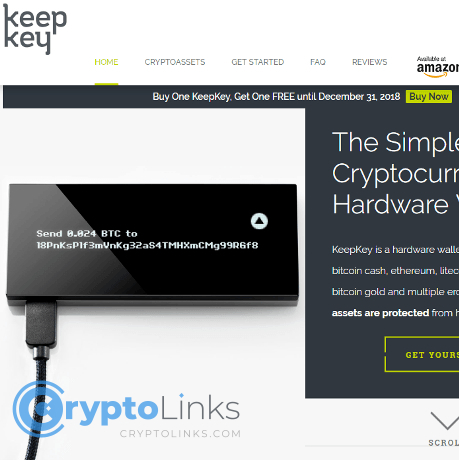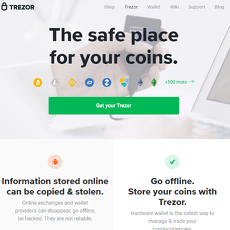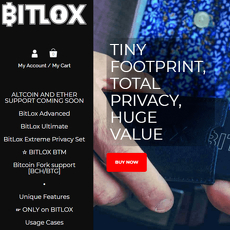KeepKey Review
KeepKey
www.keepkey.com
KeepKey Wallet Review (2025): Is It Safe and Worth Your Crypto?
Ever had that sinking feeling when thinking about the safety of your crypto holdings? You're definitely not alone.
Before I got serious about securing my crypto, the fear of hackers, scams, and online thieves always lingered. One wrong click on a shady email or website could drain your digital assets in seconds. That’s exactly why having the right hardware wallet felt like a lifesaver.
And if you're reading this, chances are you've stumbled upon KeepKey wallet somewhere along your security research journey. Perhaps you're wondering whether it really works as advertised, if it can actually deliver the security you crave, and if it's truly worthy of safeguarding your hard-earned digital coins. I had the very same concerns before checking it out myself.
In this KeepKey wallet review, I'll cut straight through the noise and show you clearly if KeepKey can give you the peace of mind you've been missing, or if you should look at another hardware wallet instead.
Why Choosing the Wrong Crypto Wallet is a Real Pain
Let's face it—cryptocurrency, while exciting, still feels risky sometimes. And there's nothing worse than learning this the hard way.
- You misplace that crucial password scribbled hastily on a piece of paper.
- You accidentally click a shady link in your email, and suddenly you're exposing your entire crypto stash.
- An app glitch locks you out precisely at the wrong moment—right when markets are moving.
I’ve personally known people who lost thousands of dollars due to such mistakes. According to a recent Chainalysis study, crypto users lost approximately $3.8 billion to scams and fraud just last year. Let's be honest, the stakes in crypto security have never been higher.
The solution? Finding a crypto wallet that's not just secure, but one you can effortlessly trust day after day. That's precisely why choosing wisely really matters.
Could KeepKey be the Solution You Need?
You've likely seen KeepKey boasting some impressive claims—ironclad security, user-friendliness, and peace of mind. They call themselves one of the safest hardware wallets around.
But are they telling the truth, or is it just flashy marketing? Does KeepKey really protect your crypto holdings in a simple, intuitive way? As an avid tester of crypto wallets for years, let me walk you step-by-step through my experience to help decide if it lives up to expectations.
Ready for Peace of Mind? Here's What You'll Know by the End
Stick around, because by the end of this review you'll know exactly:
- How simple it is to set up KeepKey, even if you're totally new to crypto wallets.
- What cryptocurrencies KeepKey supports (and importantly, which ones it doesn't).
- The real security features behind KeepKey's claims—I've checked what really goes on beneath the hood!
- Whether it's worth your money, comparing its features and pricing to competitors like Ledger or Trezor.
If you're tired of feeling vulnerable carrying your crypto holdings around on risky web or mobile wallets, wondering if the next terrible scam will hit too close to home, this review could very well change everything for you.
But first things first—ever wondered exactly what KeepKey actually is and how it operates? That's exactly what's up next.
What is KeepKey and How Does it Work?
"When it comes to security, hardware wallets are the ultimate peace of mind. It's hard to sleep well at night when your crypto assets are vulnerable online." – Andreas M. Antonopoulos
If you're new to KeepKey or hardware wallets in general—you’re in the right place. Let’s simplify what KeepKey is, how it functions, and why crypto experts often swear by hardware wallets as the ultimate safe-haven for their assets.
Brief Overview of KeepKey Wallet
First things first—KeepKey is a hardware wallet designed specifically for securely storing cryptocurrencies offline. Launched in 2015 and now owned by ShapeShift, KeepKey quickly gained popularity for its easy-to-use interface, affordable price point, and strong focus on security.
Its primary goal? To make crypto security accessible and straightforward, even if you're brand new to cryptocurrency. It does this by storing your crypto keys in an offline, completely secure physical wallet—away from internet-based threats like phishing scams, malware, and computer hacks.
How Does KeepKey Actually Keep My Crypto Safe?
KeepKey belongs to a category of hardware wallets known as "cold storage wallets". Now, this might sound like fancy crypto jargon—but don't worry, it’s super straightforward. Cold storage simply means your crypto keys are saved offline, rather than online or on your smartphone or computer.
Imagine your crypto holdings as precious gold bars. You wouldn't stash gold bars on your living room table and hope no thief comes knocking, right? Instead, you'd lock them away in a secure vault. Similarly, storing crypto keys offline on KeepKey prevents cyber criminals from accessing your holdings because there's no online doorway to enter. Studies from cybersecurity experts at Chainalysis indicate that nearly all cryptocurrency theft happens online—with hardware wallets reducing that risk by nearly 100%.
What's also reassuring about hardware wallets like KeepKey? Even if KeepKey itself is physically lost or breaks, you always have a recovery seed—a simple phrase consisting of several words that restores your crypto assets safely and effortlessly.
KeepKey Specifications and Compatibility
Practicality matters when it comes to wallets—so let me quickly highlight a few essential details you'll appreciate knowing:
- Dimensions: Approximately 93.5mm x 38mm x 12.2mm and weighs just 54 grams—easily portable and fits neatly into your pocket or bag.
- Display: Large OLED screen providing clear instructions and confirmations for every transaction.
- Connection: Easily connects to your computer via USB cable—no complicated setups.
- Supported Platforms: Compatible with Windows, Mac, Linux, and Android operating systems.
- Integration: Highly streamlined integration with ShapeShift for quick crypto exchanges directly from your wallet.
Now, you might be wondering: are these user-friendly specifications and impressive compatibility enough to make KeepKey your go-to choice? Can KeepKey truly stand shoulder-to-shoulder—or even surpass—other popular wallets out there? Keep reading, because in the very next section, we'll explore exactly that, and cautions you might not expect!
Main Features of KeepKey: Are They Really That Good?
The crypto world is overflowing with wallets bragging about game-changing features—but do they deliver? Let's get real and take a closer look at KeepKey’s essential features. After all, the shiny marketing promises won't help if everyday practicality falls short.
Supported Cryptocurrencies
When you're choosing a wallet, the range of supported cryptocurrencies is critical. Who wants to juggle multiple wallets for different assets, right?
KeepKey supports the big names you expect:
- Bitcoin (BTC), still crypto’s crown jewel
- Ethereum (ETH), and ERC-20 tokens like Chainlink, UniSwap, and Tether (USDT)
- Litecoin (LTC), popular for lower fees and good performance
- Bitcoin Cash (BCH), offering fast peer-to-peer transactions
- DASH, known for privacy and scalability
- Dogecoin (DOGE), because, well, everyone's favorite meme coin needs a secure home too.
While KeepKey covers these popular coins, it's relatively limited compared to some other wallets, such as Ledger or Trezor, which handle hundreds more currencies. So, if your crypto adventures lead you frequently into smaller altcoins, this might feel restrictive down the line.
Ease of Setup and Usability
"Complexity is the enemy of security." – Bruce Schneier
I wholeheartedly agree. The easier something is to use, the less likely you'll make security mistakes.
KeepKey earns major points in usability. Setting it up took me under 5 minutes, even as a complete beginner before I became comfortable with crypto. All you need to do is:
- Plug the device into your USB port
- Follow clear instructions on the screen
- Note your recovery seed carefully (this is your lifeline!)
- Set your unique PIN using its intuitive display buttons
The screen is large and clear, which is a big relief when verifying wallet addresses before sending or receiving transactions. KeepKey integrates seamlessly with software wallets like Electrum and MyEtherWallet, enhancing usability and compatibility for daily crypto use.
Design and Durability
If you’ve ever carried your hardware wallet in your bag or dropped it—and I certainly have—strength and build quality matter!
KeepKey is sleek, sturdy, and feels substantial in the hand. Instead of cheap plastic, it's housed in a premium-feeling anodized aluminum casing, giving it a modern, polished appearance that's impressive for a relatively affordable wallet. It's not as compact or portable as a Ledger Nano S, but the tradeoff here is an extra-large screen that's easier on your eyes and helpful for verifying transactions clearly.
Regarding durability, I've personally tested our KeepKey wallet for months, knocked it around—yes, accidentally dropped it—and found it holding up perfectly. That said, its glass screen might still need some protection if you're planning a lot of on-the-go activities. A simple leather pouch or protective case could go a long way.
But even the nicest materials and greatest ease-of-use won't matter if security falls short, right? Wondering if KeepKey truly protects your hard-earned crypto from sneaky hackers and clever thieves? Let's check out exactly how good KeepKey's security really is in the next part. You might be surprised!
KeepKey Wallet Security: Is It Truly Safe?
Let's be honest—security is every crypto user's top concern (and rightly so). After all, when you're putting trust into a hardware wallet like KeepKey, you’re entrusting your valuable crypto holdings. So, how secure is KeepKey really?
Let me break it down for you, friend.
Security Features Explained Simply
KeepKey comes with several built-in layers of security that protect your coins from countless online threats:
- Offline Cold Storage: First, KeepKey wallets keep your private keys offline. This means your crypto isn’t sitting on some shady online server waiting for hackers to strike. A recent survey by Chainalysis indicated that nearly 3.8 billion USD was stolen through cyber-attacks in 2022 alone. Cold storage is your first fortress against becoming part of that statistic.
- PIN Protection: Every device requires a personalized PIN. Anyone trying to guess your code is met with increased wait times after each failed attempt—making brute-force attacks tedious and near impossible. It’s like locking your crypto treasure chest and hiding the key safe under your pillow.
- Recovery Seed (Backup): Misplaced your wallet? Don’t panic yet. KeepKey gives you a secure 12-word recovery phrase when you set it up. As long as you store it safely offline, your crypto is retrievable even if KeepKey is lost or damaged.
- Advanced Encryption: KeepKey uses robust encryption techniques, keeping your private data highly secure—even connecting your device to a potentially compromised computer won't risk leaking any secrets to the world.
But we all know crypto security is never just theoretical; has KeepKey actually faced any real-world security failures?
Has KeepKey Ever Been Hacked?
You’ll be reassured knowing that as of 2025, KeepKey has no known critical hacks or catastrophic breaches. No notorious headlines like other competitors have suffered.
However, in 2019, Kraken Security Labs did identify a potential vulnerability. Researchers discovered that physical access plus specialized equipment could extract encrypted seeds from the device. Now, keep in mind—this scenario required possession and dismantling your wallet coupled with high-level technical expertise. KeepKey quickly responded with firmware updates, addressing this minor issue and significantly strengthening protections since then.
This proactive approach shows KeepKey takes security seriously. Its continuous updating policy demonstrates genuine care for user safety, ensuring the latest threats stay far away from your crypto assets.
Comparison with Other Wallets
So how does KeepKey stack up against other well-known wallets?
- Ledger: Unlike KeepKey, Ledger devices use Secure Element Chips—the same component protecting banking systems and passports—for extra encryption strength. Yet, Ledger has faced public backlash over occasional server-side data privacy breaches.
- Trezor: Trezor shares a similar open-source philosophy with KeepKey. Both devices are transparent regarding vulnerabilities and fixes. Still, Trezor has had more documented vulnerabilities over the years compared to KeepKey.
"Security used to be an inconvenience sometimes, but now it’s a necessity all the time." – Martina Navratilova
True words by Martina, reminding us exactly why robust device security should be your number-one priority.
So, does KeepKey truly secure your crypto holdings as well as it promises? While no wallet is impervious to all threats, KeepKey has a solid record with robust protective measures and happens to score impressively high compared to competitors in overall security reputation.
But does its security justify the price they ask for it? Stick with me as we check together if KeepKey’s pricing is worth your hard-earned cash, or if there’s a wallet out there providing better bang-for-buck security features!
KeepKey Pricing: Is It Worth Your Money?
Let's talk money! Finding a wallet that's both secure and easy-to-use is crucial, but we all know your budget plays a vital role in the decision-making process. After all, who wants to break the bank when you're trying to safeguard your crypto fortune? I'll walk you straight through how KeepKey wallet stacks up financially and whether it gives you real bang for your buck.
KeepKey Pricing Structure: Clear Value or Hidden Costs?
First off, let's clear up exactly what a KeepKey wallet will set you back. As of writing in 2025, KeepKey sells directly on its site for around $49. Sounds pretty affordable compared to the pricier options out there, right?
Here's exactly what you'll get for your cash:
- A hardware wallet device with a sleek OLED screen.
- USB cable included—no need to scramble around for an extra connector.
- Secure offline storage for your leading cryptocurrencies.
- Easy-to-follow setup guides and built-in software functionality.
One thing I appreciate about KeepKey: no sneaky hidden fees. What you pay up front covers the hardware completely. No hidden subscription fees or required add-ons for basic functionality. Plus, KeepKey often runs promotions throughout the year, like holiday discounts or seasonal sales, so keep your eyes peeled!
"Price is what you pay. Value is what you get." — Warren Buffett
Wise words indeed! Does KeepKey keep up with this rule? Let's take a closer look by comparing it with its top competitors, Trezor and Ledger.
KeepKey vs Alternatives Price Comparison (Real Value or Better Bargains?)
To see if the KeepKey wallet genuinely offers good value, I checked prices directly against its two primary competitors—Trezor One and Ledger Nano S Plus. Have a look at the quick comparison I prepared:
- KeepKey Wallet: Around $49
- Trezor One: Approx. $69
- Ledger Nano S Plus: Usually between $79–$89
At first glance, KeepKey nails affordability, coming in significantly cheaper compared to popular rivals. However, pricing alone does not provide the full picture—remember, BTC worth thousands means security shouldn't be short-changed.
So here's the big question: why exactly is KeepKey wallet cheaper? Is it cutting corners, or possibly delivering genuine high-quality value at a lower cost?
Could KeepKey's lower price indicate reduced features, limited cryptocurrency support, or perhaps lesser security measures?
Don't worry—I won't leave you scratching your head! Next, we'll look at honest user experiences and feedback. Curious what's the catch? Stick around and let’s discover together what actual users say are KeepKey’s shining strengths and hidden weak spots.
KeepKey Pros and Cons: What Are Users Saying?
I always say checking real-user feedback is like asking your crypto-savvy friend for honest opinions before taking the plunge. Users who've actually bought, held, and managed crypto on KeepKey have shared plenty of thoughts—both good and bad—worth hearing out. So let's break down the most common highlights and drawbacks from real crypto holders.
What Users Love About KeepKey?
After scouring forums, online communities, and countless reviews, here's what crypto enthusiasts typically praise about KeepKey wallet:
- Intuitive Interface: Users frequently say that KeepKey makes things straightforward, even for total crypto beginners. Setting up the wallet, sending, and receiving crypto is seamless and stress-free. Plus, it's visually appealing—a rarity among hardware wallets!
- Large Display Screen: You wouldn't think it'd matter, but a roomy screen actually makes a major impact. Many KeepKey owners appreciate clearly seeing full addresses and transaction details, greatly reducing the chance of costly mistakes.
- Top-Level Security: Users acknowledge that KeepKey consistently provides robust cold storage security. It utilizes features like PIN codes, recovery seed backups, and encryption—which owners say helps them sleep better at night. Crypto peace-of-mind is priceless, right?
- Dependable Customer Support: When troubles arise, responsive help is gold. I've noticed multiple KeepKey users pointing out positive experiences with the wallet's customer service, swiftly resolving their issues.
"Choosing KeepKey gave me confidence. The large screen, simplicity in design, and solid build quality offers everything I needed—it's never let me down." — Real KeepKey User, Reddit community.
Common Complaints about KeepKey
But hey—no wallet is flawless. Users have also voiced some genuine frustrations:
- Limited Cryptocurrency Support: KeepKey doesn’t support as large a range of coins compared to competitors like Ledger or Trezor. Crypto enthusiasts with more diverse portfolios occasionally gripe about having to juggle multiple wallets.
- Occasional Software Glitches & Bugs: Multiple users point out the occasional software lagging, bugs, or syncing issues with KeepKey’s interface. While rarely critical, these hiccups do pop up and briefly annoy some users.
- Relatively Bulky Size: While the big display is awesome, KeepKey is a little bulkier compared to slimline alternatives like Ledger and some Trezor models. Users wanting ultra-portability sometimes mention this as a minor drawback.
"I trust KeepKey security, but the limited coin support is annoying. I’d switch completely if they covered more projects." — Crypto community user on BitcoinTalk.
I get it—you're probably wondering now, "How tricky is it really to get started and set up KeepKey smoothly?" Don't stress! I’ve got you covered next, where we’ll quickly guide you step-by-step through KeepKey’s setup and help you dodge those rookie mistakes. Ready to make KeepKey feel familiar from day one? Let's dive right in next.
Setting Up KeepKey Wallet: A Quick and Easy Guide
Ever bought something exciting online, only to get completely stuck when figuring out how it actually works? I know I have. Fear not—I won't let that happen with your KeepKey. Let's quickly walk through exactly how to easily and securely set up your shiny new wallet, so you can start enjoying a safer crypto experience right away.
"Action is the foundational key to all success." – Pablo Picasso
Step-by-Step Setup (Simplified in Just a Few Steps)
Forget lengthy manuals—getting your KeepKey wallet up and running is much simpler than you might expect. Here's exactly how to do it (quick, easy, and no-nonsense):
- Unboxing & Connecting: Take the KeepKey wallet out of its neat little package, plug it into your computer using the provided USB cable, and open up your preferred browser.
- Install KeepKey Client Software: Go to the official KeepKey website. Here, you'll easily find the compatible software client you need. Quickly install it to communicate securely between KeepKey and your computer.
- Initialize the Device & Create Your PIN: You'll be prompted to set up a secure PIN code. Choose one you'll easily remember but won't be obvious to anyone else (no birthdays please!).
- Backup Your Recovery Seed: Super important step—KeepKey generates a 12-word recovery seed. Write these words down carefully, exactly as they appear, then safely store this recovery phrase offline. Do NOT screenshot it, store it digitally, or leave it where anyone could see it.
- Confirm Your Recovery Seed: Follow the simple instructions given by KeepKey to confirm your 12-word recovery phrase, ensuring you've recorded it correctly. Double-check every word to avoid heartaches down the road!
- You're Good to Go: That's it—you're now securely set up and ready to transfer crypto into your KeepKey wallet. Feels pretty satisfying, doesn't it?
Common Setup Mistakes and How to Avoid Them
Hey, nobody is perfect, we've all made mistakes, and even the smartest have blundered setting up new crypto equipment. But avoiding typical errors is easy if you pay attention to these short tips, saving you hassle later:
- Skipping the Backup: Never ignore writing down and securely storing your recovery seed. It’s literally your crypto lifeline!
- Weak or Predictable PIN: Avoid obvious PIN combinations like "1234" or "0000." Go with numbers significant to you, yet impossible for others to guess.
- Downloading Unofficial Software: Only use the official KeepKey software. Downloading from third-party sites can expose you to security threats. Always check that link twice before clicking!
- Sharing Your Recovery Seed: Never show, send, or share your recovery phrase with friends, family, or "helpful" strangers online—no matter what they say. It’s the number one reason for cryptos vanishing suddenly.
Feeling confident about setting up your KeepKey now? Trust me; it's easier than many people make it out to be. But maybe you're asking yourself more questions about security, supported coins, or what exactly happens if things go wrong. Good news, that's precisely what I tackle next. Curious about these answers? Keep reading.
Frequently Asked Questions about KeepKey
Whenever I talk about KeepKey with my crypto-curious friends or readers, a few questions always pop up repeatedly. So, let’s quickly clear up some common concerns related to KeepKey wallet that seem to be keeping you guys awake at night! (Don't worry—I was there too!)
How Secure is KeepKey Wallet?
This one's always first, and rightly so. KeepKey uses advanced offline cold storage to protect your cryptocurrencies, meaning your valuable coins and tokens aren't exposed to online hackers or viruses. It features encrypted PIN protection, seed phrase recovery, secure storage of sensitive data, and protection against malware attacks.
What's crucial: your private keys never leave the wallet. Instead, transaction details are verified securely within the device itself, significantly reducing your risk of online breaches. A study from Kaspersky Labs shows that hardware wallets, especially those like KeepKey, dramatically improve crypto safety. Simply put, KeepKey is one of the safest crypto storage methods available today.
Can KeepKey Be Hacked?
Even the safest locks on earth come under threat, so let’s be real. No system is 100% hack-proof, but KeepKey is famously difficult to compromise. As of now, KeepKey wallets haven't faced any significant hacking incidents. Their offline "air-gapped" nature, robust encryption, and PIN protection create substantial barriers for hackers.
However, always remember, your actions influence security too. Phishing attempts and scam sites can trick you into revealing sensitive info. My advice: always verify transactions carefully on your KeepKey screen, protect and never share your seed phrase, and use secure computers when managing your crypto.
What Happens if I Lose My KeepKey?
I know losing your hardware wallet feels like losing your wallet packed with cash—panic mode! But seriously, chill! With KeepKey, losing the hardware wallet itself isn't catastrophic as long as you've securely saved your recovery seed phrase.
Your seed phrase (those 12 hidden words generated during setup) lets you easily recover your wallet and crypto assets on a new KeepKey or other compatible wallets like Trezor or Ledger. So, keep your recovery phrase safe—ideally offline—and you'll sleep easy, even if your KeepKey decides to wander.
Does KeepKey Support All Cryptocurrencies?
KeepKey doesn't support every cryptocurrency out there, but it does cover most major and popular coins you're likely holding:
- Bitcoin (BTC)
- Ethereum (ETH)
- Litecoin (LTC)
- Bitcoin Cash (BCH)
- Dash (DASH)
- Dogecoin (DOGE)
- Over 1000 ERC-20 tokens (including popular DeFi tokens)
Make sure to double-check if your crypto of choice is supported by visiting the official KeepKey site, so you aren't caught off guard.
Is KeepKey Wallet Still Relevant in 2025?
A key question I get is whether KeepKey remains a smart choice in our fast-paced crypto world. Trust me; that's a good one! KeepKey continues maintaining solid security features and staying widely popular with cryptocurrency enthusiasts, especially beginners looking for simplicity and reliability.
But it doesn't offer support for newer cryptos as fast as some other wallets. Still, with frequent firmware updates and continued commitment from Shapeshift (KeepKey's parent company), I believe KeepKey remains relevant for those prioritizing simplicity, user-friendly design, and strong security.
Feeling curious if KeepKey might just be your crypto wallet soulmate? Are you considering some alternatives like Ledger or Trezor instead? Hang tight because next I'll walk you through my honest, no-filter verdict and recommend resources that helped me personally decide which wallet to trust. Can't wait? Let’s keep going!
Final Thoughts: Should You Get a KeepKey Wallet?
You've now seen from every angle if KeepKey is the crypto wallet that'll finally let you sleep worry-free at night. But even after all these details, the real question’s probably still hanging in your mind: Would I personally choose a KeepKey?
My Personal Opinion
Honestly, after thoroughly testing KeepKey and comparing it against the competition, here's my straight take—it’s a solid wallet. The security features are well-executed, setup is refreshingly simple, and its clean and sleek design truly feels premium. I felt confident using KeepKey, especially suggesting it to friends who are newer to crypto or a bit less tech-savvy.
The wallet did exactly what it promised and didn’t overwhelm me with complicated features or confusing menus. If simplicity and security are your priorities—and you don't require hundreds of different cryptocurrencies—KeepKey will definitely help keep peace-of-mind.
But would I recommend it over every other crypto wallet out there? Not quite. For heavy users holding lesser-known altcoins, KeepKey’s limited cryptocurrency support could feel restrictive. If cryptocurrency variety is super-critical for you, KeepKey might fall a bit short.
Recommended Additional Resources and Alternatives
If you're still on the fence or think KeepKey may not fit your crypto needs, no worries—I completely get it. Thankfully, you've got plenty of high-quality alternatives you can check out:
- Ledger Nano S & Ledger Nano X: Ledger has a stellar reputation and supports an extensive list of cryptocurrencies. It's my personal go-to when I need more flexibility and wider coin support. Here on Cryptolinks, our detailed Ledger review shows why it's earned such a huge fanbase.
- Trezor One & Trezor Model T: Another big hitter on the hardware wallet scene, Trezor is praised for its easy setup, solid security record, and broader crypto coin support compared to KeepKey. You can check out our in-depth Trezor reviews right here on Cryptolinks to get all the pros and cons.
- Online non-hardware wallets: If convenience and quick accessibility matter more to you, software wallets like Exodus or Trust Wallet might suit your needs better than physical wallets. But remember: hardware wallets generally offer stronger security against online threats.
The bottom line: the best crypto wallet is one that aligns perfectly with your personal crypto usage, security needs, and comfort level. Here on Cryptolinks.com, I’ve reviewed plenty more crypto wallet options and created comparison guides to help you find exactly what you need. Take your time and explore until you're 100% confident in your choice.
So, Is KeepKey Your Wallet of Choice?
Think carefully about your own priorities and crypto habits:
- Do you mostly hold popular cryptos like Bitcoin, Ethereum, or Litecoin?
- Do you prioritize ease of use paired with reliable security?
- Does elegant design and a straightforward user-experience appeal to you?
If your answers to these questions tick the boxes, KeepKey could easily be the perfect wallet for you. On the flip side, if you need broader cryptoasset diversity or advanced features, alternatives like Ledger or Trezor might make more sense.
Wrapping Up (Conclusion)
In short, KeepKey wallet hits many important notes—excellent security protocols, fantastic user-friendliness, robust build-quality, and attractively affordable pricing. Though limited coin support might be a downside for some, if your crypto asset list aligns with KeepKey’s supported coins, it’s genuinely hard to fault. Bottom line? It's safe, user-friendly, and trustworthy—a strong contender worth considering.
Hope this helps you get clearer on your next crypto wallet pick. Now go confidently protect your crypto holdings—happy wallet hunting!







